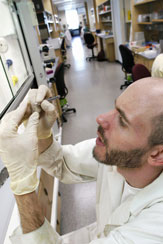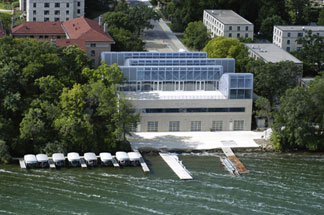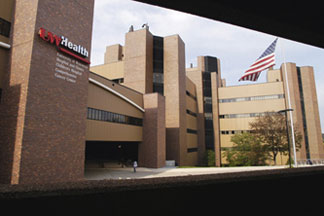Year in Review 2004-2005
January 2005
Work begins on a $24 million Veterinary Diagnostic Lab, located adjacent to the School of Veterinary Medicine. The 82,000–square–foot facility will provide a state–of–the–art laboratory for animal testing and routine detection of disease.
Mary Rouse, who has served UW–Madison for nearly 38 years, most notably as dean of students and director of the Morgridge Center for Public Service, announces plans to retire in June 2005. Rouse helped establish the Morgridge Center in 1994.
The new Office of Undergraduate Academic Awards opens under the direction of Julie Stubbs. Designed to encourage UW–Madison students to compete at the highest levels academically, the office consolidates all campuswide awards and scholarship programs, and serves as a resource for national and international award competitions. The office hopes to increase awareness of the compteitions, and recognize and nurture talented undergraduates early in their college careers.
February 2005
Four campus units plan to relocate from 905 University Ave. to other campus locations to accommodate the growth of the School of Business. The McBurney Disability Resource Center, the Counseling and Consultation Services arm of University Health Services, and the offices of the Division of Continuing Studies and College of Letters and Science School of Human Ecology Career Services all will move at the end of the spring semester. The building at 905 University Ave. will be removed to make way for the new MBA wing of Grainger Hall.
The new $8.35 million Porter Boathouse, overlooking the Howard Temin Lakeshore Path and Lake Mendota, opens. The new facility has two rowing tanks and 52,000 square feet of space, allowing all of the UW crew teams to practice at the same time.
Susan Cook, professor of music and director of graduate studies at the School of Music, is named executive director of the Arts Institute, a unit sponsored by the College of Letters and Science, the School of Education and the School of Human Ecology. Cook hopes to expand the institute’s programs, as well as its interarts and interdisciplinary presence.
Carl de Boor, a professor emeritus of computer sciences and mathematics, wins the 2003 National Medal of Science, the most prestigious science award in the country. An expert in numerical analysis, de Boor is the second university mathematician to be so honored.

From lab to market
The Wisconsin Alumni Research Foundation (WARF) is among the recipients of the 2003 National Medal of Technology, an annual award given by the president of the United States that recognizes significant and lasting contributions to the country’s economic, environmental and social well–being through the development and commercialization of technology. The award recognizes WARF’s contributions to the field of university technology transfer.
Wisconsin Union officials begin discussing with students, faculty and staff possible renovations to Memorial Union and Union South. Officials are considering a 300–seat film theater, space for student organizations, new meeting rooms, a new Hoofers area and piers, and a 1,000–seat ballroom adjoining the Wisconsin Union Theater at Memorial Union. Union South would receive either a major renovation of the existing building or a complete facelift, including an outdoor amphitheater, a new “urban terrace,” new food service options and infrastructure upgrades.
Gov. Jim Doyle presents a two–year state budget to the Legislature that would add funding to deal with major university priorities. His budget would hold tuition increases to between 5 and 7 percent each year and would increase financial aid.
The International Student Services office, the Wisconsin Alumni Association and the University of Wisconsin Foundation partner to create the International Students Assistance Fund to help students whose financial assistance was disrupted following the December tsunami that struck south Asia. The fund is sustained by private donors who wish to aid international students facing unusual hardship.
March 2005
The Oscar Rennebohm Foundation announces a $15 million gift to help build the planned Interdisciplinary Research Complex, which had received Board of Regents approval in November.
UW Hospital and Clinics is named one of the nation’s top 100 hospitals by Solucient, a company that provides comparative national measurements of cost, quality and performance in health care. UW Hospital is one of only 15 hospitals — and the only one in Wisconsin — chosen in the category of “major teaching hospitals.”
Steve Van Ess, director of the Office of Student Financial Services, announces plans to retire after a 30–year career at UW–Madison. “I’m really going to miss this place. I’ve loved every minute of it,” he says.
The campus mourns the loss of “Mr. Wisconsin,” former Wisconsin Alumni Association executive director Arlie Mucks Jr., who died at the age of 84.


